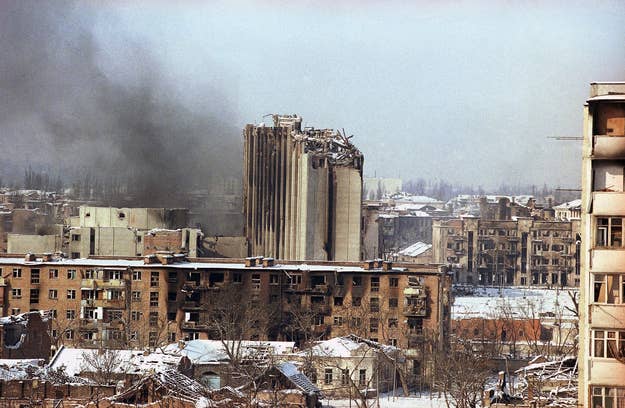
An unfortunate consequence of the terror acts allegedly carried out by the Tsarnaev brothers is that Americans are learning what amounts to the official Russian story of their homeland: the Republic of Chechyna.
It appears almost certain that Dzhokhar and Tamerlan executed the bombings that left three people dead and scores wounded at the Boston Marathon on Tuesday. But it's highly speculative — not to mention irresponsible — to assume they did so because they were reportedly born in a region of the world that has a very complicated history.
In the four days of coverage leading up to Dzhokhar's capture, we've been told that Chechnya is a supposed "hotbed for terrorism," and its people are deeply influenced by jihadist extremism. And Chechnya and Russia, for reasons that date back a few hundred years, just can't seem to get along, we're told.
"We can't be politically correct," Rep. Peter King said on CNN. "We have to say: Has radicalization extended into the Chechen community?"
In fact, Chechnya is no more a "hotbed" or "breeding ground" for terrorism than any other nation conquered by a superior enemy left to build itself back up with little help from its oppressor. It has been the victim of a particularly bloody conquest, and has created one of the world's most brutal separatist groups. But the separatists' violence has always been aimed at Russia, not at America or other targets of global Jihad.
For more than 200 years, Chechnya, along with every other Caucasus nation, endured one external conquest after another. When they weren't fighting the Ottoman Empire or the Mongols from the East, they were fighting the Russian Empire. The Caucasian War of 1817-1864 ended with Chechens and roughly a dozen other ethnic groups divided into their own autonomous regions—all forcibly incorporated into southern Russia (or the South Caucasus).
The terror did not stop there. Between 1941-1944, Stalin deported 1.4 million people from western regions of the former USSR—including some 387,000 Chechens—to Central Asia.
Why? With Stalin, you never knew for sure, but he reportedly accused them of collaborating with the Nazis during World War II.
And let's not forget those two wars Chechnya fought against Russia over the course of 15 years, after the collapse of the Soviet Union in 1991. During that period, human rights groups documented severe human rights abuses carried out by Russian security forces against innocent Chechen civilians.
More than 80,000 Chechen civilians died during the two wars, according to several estimates.
The Chechen response has indeed grown increasingly radical, and brutal. The worst act of Chechen terror was probably the 2004 Beslan Massacre, where Chechen terrorists raided a school in a bloody takeover that left more than 300 children dead. Chechen extremists also took over a Moscow theater in 2002, leaving more than 100 innocent people dead. There are many more.
These horrible attacks were carried out on Russian soil. Chechen extremism has not had a global focus. And most Chechens are not Muslim extremists who wake up with Jihad on their mind.
So when U.S. Representative Peter King (R-NY) posed his reckless question, I cringed. The New York Congressman was supposed to galvanize our "oneness" as a diverse nation during a time of morning. Instead, he articulated the "otherness" of one group of people.
But I don't recall the media profiling Caucasian--pardon the pun--young males with buzzcuts as "white extremists" when Timothy McVeigh murdered 168 of people during the Oklahoma City bombings. Let's extend the same consideration to the relative handful of Chechens in the United States, with whom, by all accounts, the Tsarnaevs had few if any ties.
That will be more than they get from their fellow citizens of the Russian federation. Indeed, when I was living in Kiev, my closest friends from the Caucasus often referred to me as a "brother" because when we walk the streets together, we were both viewed as "black people." They could, after all, relate to my experience of weekly shakedowns by racist Ukrainian cops.
And it is not unusual for skinheads in Kiev or Moscow to beat a Georgian, Chechen or Armenian on the streets in broad daylight and not get help from the anyone—including the police. I never believed I had as much in common with a "Caucasian" person until I lived in the former USSR.
(The Sova Center, a non-profit that tracks xenophobia in Russia, documents the country's issues with racism regularly)
As much as we've heard about Chechen extremists inflicting terror in Russia, the reality is that many more innocent Chechens have endured hostility and terror of their own.
And if Chechnya must be referred to as a "breeding ground of terror," it is imperative to discuss the external forces that have been breeding that terror. There are multiple sides to every story, but the only one we're getting is full of talking points that seem to be coming straight from the Russian Embassy.
Hopefully, the next few days will provide a more balanced round of stories on this very complex region of the world, as Chechnya does not deserve another news cycle of incomplete reporting directed at their homeland over the actions of a few misguided young men.
